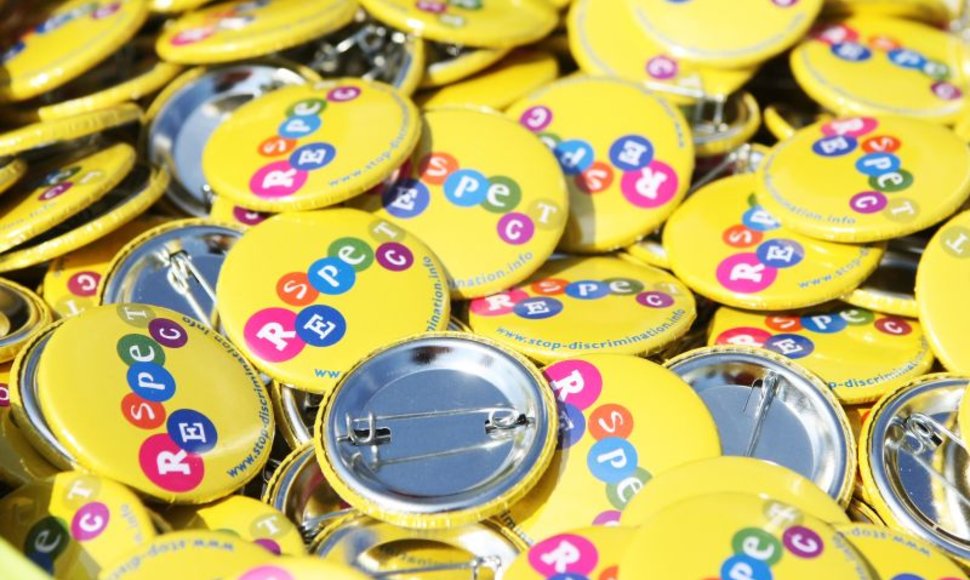Stigmas overcome even bravest lawmakers
When the famous gay singer Ruslanas Kirilkinas recently was hit by eggs thrown at a concert, in the sticks, and rushed to hospital thereafter due to a minor injury, no Lithuanian politician spoke out and condemned the attack, which, no doubt, would cause a major public outcry in support of the minority in the West.
 |
| BTV nuotr./Ruslanas Kirilkinas |
In fact, the attack has remained unaddressed not only by state officials, but also by public personalities and even fellow performers.
“The stigma of labels, and especially the one having to do anything with the defense of minorities, particularly of the LGBT community, in the country still is a lot more powerful and far-reaching, especially in the political realm, than the will to stand up and speak up for the case of tolerance,” said Mindaugas Jakubauskas, a sociologist.
In another headline-grabbing case of intolerance, African singer Viktoras Diawara-Vee, living in Vilnius with his Lithuanian wife and two toddlers, last year experienced the rage of nationalists in Kaunas, who at the celebration of the March 11 Lithuanian Independence Restoration Day, pelted him with racial slurs, calling him “a sleazy monkey.”
“I was standing in a stupor, unable to believe that this was happening in the broad light of the day,” Diawara recalled.
Had the Lithuanian president, the prime minister or the Parliament speaker publicly condemned the racist bravado? No.
 |
| Viktoras Diawara |
In fact, a number of Lithuanian MPs from across of the political isle had encouraged the marchers, portraying them as real patriots. But Diawara shakes his head: “It’s high time to make a clear distinction between patriotism and extremism. I just don’t see that happening in Lithuania yet.”
Most vulnerable social groups
An EU survey conducted in Lithuania last year put elderly people and homosexuals at the top of the list of intolerance, while a poll by Vilmorus, a public opinion and market research company, ranked mentally ill persons the first on the list, followed by elderly people.
The poll has also revealed a rising intolerance against gays and ethnic minorities in Lithuania. Nevertheless, tolerance issues have not found room in the Lithuanian EU Presidency’s agenda.
“Lithuania’s priority issues during the [Presidency], as far as youth is concerned, will be youth social involvement and tackling youth unemployment,” said Petras Uksas, a representative of the Youth Affairs Department at the Ministry of Social Security and Labor, responsible for implementation of youth policies in the country.
Still, with the approaching Lithuanian EU Council Presidency set for the second half of 2013, every slap in the face to tolerance, as in the cases of Kirilkinas and Diawara, are heard especially loud and smear the country’s efforts to burnish its image as a safe and friendly European state.
Ahead of the EU Presidency, in efforts to boost tolerance levels in the country, especially among young people, Lithuania focuses on education as various tolerance-promoting projects, like the “Tolerance’s umbrella,” encompassing all secondary schools and aiming to explain to every schoolchild the essence of the word “tolerance” and foster the virtue. These efforts are underway, or already have been finished.
But Salomėja Slabosevičienė, a retired teacher and former deputy principle of a secondary school, cast serious doubt on the tolerance programs, insisting they are often “stamped out” in appeasing the strict EU and local human rights watchdogs.
“From my own experience, many of the programs aiming to promote tolerance at school are stitched up hurriedly, after schools get some grants for it. While teachers are often preoccupied with the thought of how to get a grant for that and how to put a tick in the school’s syllabus in such a way that no one can nag them about the use of money, the programs and the cause of tolerance are doomed,” said convinced Slabosevičienė.
How should nationalists be treated?
With the borders open and free movement of people, more and more Lithuanians are able to get a taste of Western lifestyles. But, ironically, the encounters with cultural variety by a part of Lithuanian society trigger contempt for it and bolster nationalistic moods.
When the aforementioned singer, Viktoras Diawara-Vee, worried about the deteriorating situation in his native Mali, put on the Web a post sharing his concern about his parents’ safety in the war-ravaged African country and his intentions of bringing them over to Lithuania, his post sparked a raft of racy, racism-laden comments. Most of them urged the singer to scrap his plans.
“It was sickening to the guts,” recalled the singer.
He’s been emphasizing lately that he is worried about his family’s safety and the rising xenophobia in Lithuania. “It’s high time to make a clear distinction between patriotism, nationalism, and extremism at the highest levels or power, but I just don’t see that happening in Lithuania yet,” Diawara noted.
If slurs of hatred broke out publicly elsewhere in the EU, a self-respecting politician would no doubt hurry to condemn the bravado and urge law enforcement to crack down on the hate mongers.
This is not likely to happen in Lithuania, where the boundaries of patriotism, nationality, ethnic identity and extremism are often too opaque, twisted and lacking a distinct assessment of the political and public life’s key leaders.
How should one treat the Independence Day Restoration celebration’s youth, shouting nationalistic slogans like “Lithuania for Lithuanians”? It seems the question has caught off guard even the leader of the Lithuanian government, Algirdas Butkevičius, who struggled to give a quick and clear response.
“Unless they shout the slogan, I am ok with them, and the marching,” he muttered.
Meanwhile, Lithuanian President Dalia Grybauskaitė has embraced the youth, describing it as “a national youth.”
The description has confounded a Wiesenthal Center representative who, after monitoring the Independence Restoration Day raucous marchers, issued warnings for Lithuania of “budding fascism” in the country.
Maybe too harsh and unreasonable a statement for the small Baltic country which has had its statehood put in doubt several times in the past, but with many Lithuanian officials often finding issues of tolerance “politically sensitive,” the levels of tolerance in the country will keep dropping.
Legislative initiative to boost tolerance
"As long Lithuanian politicians keep putting issues of patriotism and tolerance on par with patriotic impassiveness or servility to the EU, and a threat for Lithuania’s national security, as long as a clear distinction between patriotism and extremism is not drawn, the cause of tolerance in the country is doomed,” said one senior pollster at a major public opinion research company, on the condition of anonymity.
For Artūras Račas, a well-known Lithuanian analyst and former editor-in-chief of news agency BNS, it is all about the journalistic approach. “Unfortunately, racism, homophobia, and other fear-laden [attitudes] are not a rarity in the Lithuanian media... When every journalist feels his or her personal responsibility for putting out a message on issues of minorities, without [previously] biased estimations and opinions, that will change,” Račas said.
In the most recent legislative initiative, Conservative parliamentarian Vytautas Juozapaitis has succeeded in ramping up enough support from other MPs for a draft bill envisioning involvement of the International Tolerance Day among other memorable days in Lithuania.
“Tolerance is neither a privilege nor indifference. Very often the roots of intolerance lurk in the unawareness and fears of something or somebody we do not understand or do not know. Tolerance ought to be inoculated from an early age, and that is where the International Tolerance Day’s commemoration in a state-set order will help the cause,” Juozapaitis said.












